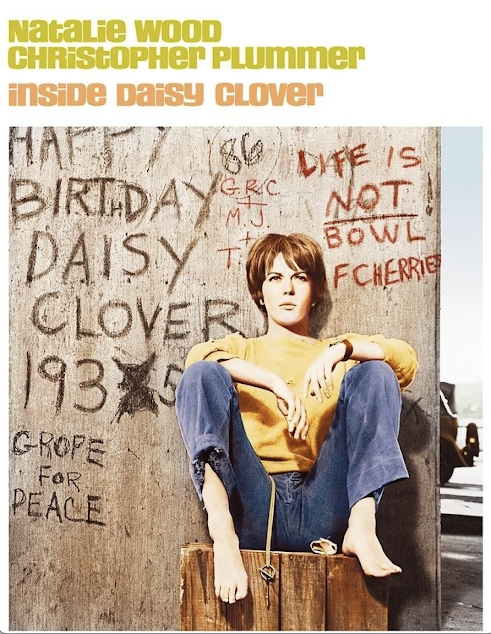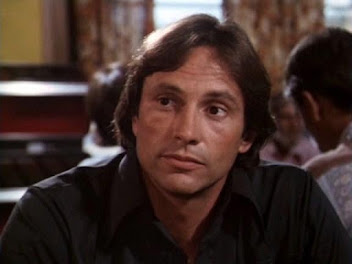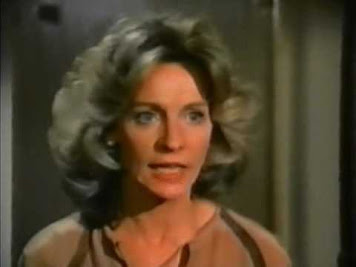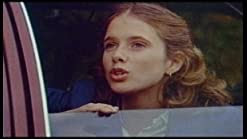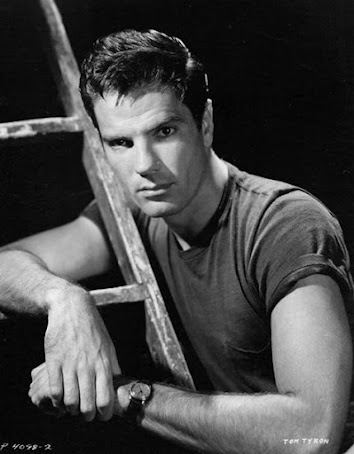Hollywood loves making films about Hollywood; but very rarely do they do it well.
What can I say about this film I have seen at least a dozen times (and own a copy of in my DVD collection) but really, really don’t like? I guess I would file this one under ‘Bad Movies I Love,’ or more accurately, ‘Bad Movies Starring Actors I Love.’
Inside Daisy Clover (1965) features some of my all-time favorite stars at the height of their fame, beauty and talent: The radiant Natalie Wood, a dreamy Robert Redford, the brilliant Christopher Plummer, Ruth Gordon and Roddy McDowall. Too bad the film takes advantage of so few of its potential assets and delivers less than stellar entertainment.
It’s directed by Robert Mulligan (To Kill A Mockingbird) who had directed Wood in her moving Oscar-nominated performance in Love With the Proper Stranger opposite Steve McQueen, so it’s only natural they’d want to work together again. But instead of another gritty slice of life, they picked this glossy, overblown melodrama for their next project.
 |
| America's Sweetheart: Natalie Wood in the title role |
Set in the 1930s, the film has absolutely no sense of period. It has that slick, anachronistic mid-1960s Panavision feel, much like Harlow, made the same year. A few marcelled hairstyles on the extras and period roadsters in the background are about the only nods to any specific place and time. (Can’t compare to the authenticity of a Bonnie and Clyde or a Paper Moon.)
In the film, Daisy Clover, played by Natalie, is being built up as the latest Depression Era child star—presumably the next Shirley Temple or Judy Garland. Yet the over-the-top metallic pixie elf costume she wears in her debut film is pure ‘60s mod (shame on you, Edith Head); Miss Wood even tosses a bit of psychedelic frugging into Herb Ross’s choreography in the “You’re Gonna Hear from Me” sequence—and that the scene is filmed in black and white does not lend a shred of authenticity.
At 27, Natalie Wood was a bit long in the tooth to be portraying the 15-year old tomboy who shoots to stardom but those who know something about her life can understand why she was attracted to the role.
The story of Daisy Clover, adapted by screenwriter and film historian Gavin Lambert from his 1963 novel, held personal significance for Wood. A former child star herself, Natalie had some heavy baggage of her own. Her embattled past had included a disfiguring injury on the set of an early film; reportedly being raped by a he-man superstar as a child; affairs with a director and a legendary male crooner (both old enough to be her father) while still underage; adultery, divorce, suicide attempts and all the tabloid soap opera that seems to go hand-in-hand with glamour and fame.
Natalie Wood shined as both child and adult actress; at the tender age of 9 she was remarkable in Miracle on 34th Street, and as a teenager earned her first Oscar nomination (for Best Supporting Actress) in Rebel Without a Cause. Perhaps her finest hour on screen is her heartbreaking performance as Deenie in Splendor in the Grass opposite her soon-to-be lover Warren Beatty.
By sheer force of personality, Wood is able to breathe believability into the troubled young woman she portrays in Daisy Clover, conveying the complexities of a character who is tough on the outside but fragile on the inside, despite the fact that her role is severely underwritten. That in the movie Daisy is finally able to exorcise her demons and exact revenge in the film’s fiery climax may have been satisfying for Wood, but less so for mystified audiences trying to follow the threadbare plot.
 |
| Sorry, Natalie, Miss Show Business you're not |
It’s a hackneyed rags-to-riches anti-Cinderella tale. Sporting the same boy haircut/wig as she did as Louise in Gypsy, tomboy/urchin/gamine Natalie smokes moodily and scrawls lame graffiti on the walls of the crumbling Angel Beach boardwalk before sending her demo record to Hollywood. A miracle occurs—she’s whisked away to La La Land, screen-tested and molded by the studio head into the biggest star in the business. Daisy’s demented mother is put away in a sanitorium so Daisy can be a workhorse and money machine. Daisy falls in love with bad boy Wade Lewis but he ditches her on their honeymoon. Daisy’s mother dies. Daisy has a breakdown. And so on...fill in the cliché.
But perhaps the biggest mistake of Inside Daisy Clover was to make it a quasi-musical instead of a straight drama.
Other than “You’re Gonna Hear From Me,” which is actually quite lovely (when performed by a fine singer!), the songs by Andre Previn and his then-wife Dory Previn, who also provided the musical interludes of Valley of the Dolls, have an ersatz feel and lack of substance. But worse, the great, powerful talent as described in Lambert’s script– which makes you think of a little girl with a big voice like Judy Garland–is sadly not embodied in Natalie Wood’s Daisy Clover.
It’s supposed to be magic when dirty-faced urchin Daisy opens her mouth to sing. But it just isn’t. Dubbed by the brassy but otherwise unmemorable voice of Jackie Ward, Natalie mimes like a trouper and passably executes the energetic choreography of Herbert Ross (who also staged Funny Girl for stage and film), but no matter how much Hollywood wants us to believe it, Natalie Wood is simply not a singer or musical star.
(Why did they force this lovely young actress into so many musicals? Wood’s singing voice in West Side Story had been famously dubbed by Marni Nixon. Natalie did do her own singing in Gypsy, but the result was not pretty, her untrained voice a little too loud and slightly off-key. Here, she merely gives another competent lip-sync job. )
 |
| Stick to the drama, Daisy, you're much better at that! |
To her credit, Wood does have a few great moments in this so-so film. The sequence when Daisy is plagued by interruptions as she attempts suicide (by putting her head in a gas oven) is darkly comedic and brilliantly played. And the unforgettable scene where Daisy has a nervous breakdown while looping the Previns’ bizarre Circus number is truly terrifying, raw and real. (No wonder that Hollywood princess Carrie Fisher would pay homage to this iconic scene in her own show business opus, Postcards from the Edge, nearly 30 years later.)
For Daisy Clover, Natalie Wood was surrounded with a cast of talented heavyweights, many of them dear friends in her real life, so I do hope they all had a better time making it than audiences had seeing it. (Not that many did; it was a critical and box office flop.)
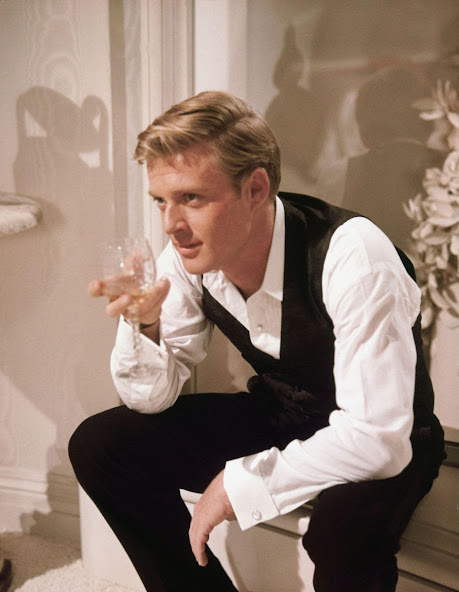 |
| Mystery Man: Robert Redford as Wade Lewis, aka Lewis Wade |
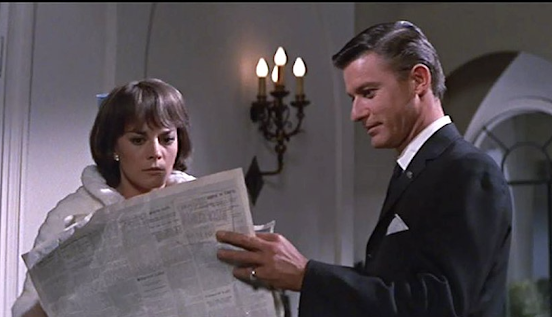 |
| Gay subtext: Roddy McDowall as Walter Baines (wait, did he also handle Wade?) |
Poor Roddy McDowall is forced to essay another thankless role here, one of many in his long career. He has about six lines of dialogue total as the Swan Studio head’s supercilious (read gay) henchman and Daisy’s watchful handler Walter Baines. (Thank goodness Mr. McDowall was able to carve out a piece of immortality for himself with the wildly popular Planet of the Apes series a few years later.)
A lifelong friend of Wood’s (he too had been a child star, along with their mutual close friend Elizabeth Taylor), McDowall was also an obsessive documentarian. The year that Daisy Clover was made, McDowall shot hours and hours of footage of Wood and a galaxy of stars who visited his Malibu beach house– including Lauren Bacall, Tony Perkins, Judy Garland, Jane Fonda and Christopher Plummer. (These home movies are more fun to watch than this film.)
 |
| The Dealer: Ruth Gordon as Lucile Clover |
Returning to the screen after a 20-year absence is Ruth Gordon as Daisy’s eccentric mother, aka The Dealer. One of the great character actors of all time (as well as the brilliant co-writer of classic films like Adam’s Rib and Pat and Mike with her husband Garson Kanin), Gordon is given precious little to do here; she speaks not a word of dialogue for 3/4 of the picture, so we’re prevented from enjoying much of her famously sardonic delivery. But the Academy did award Gordon with a Supporting Actress Oscar nomination, which opened the door to a new career and paved the way for her iconic Oscar-winning performance as Minnie Castevet in Rosemary’s Baby in 1968. Gordon’s wisecracking old lady persona became her stock in trade for a very successful third act—in films from Harold & Maude to Every Which Way But Loose and My Bodyguard, she was the 1970s version of Betty White.
With a face made for the silver screen, Robert Redford proves himself the quintessential male movie star—he positively glows with gorgeous golden boy vitality as the insouciant maverick film star Wade Lewis. This is Redford’s first major film role, after hitting the big time on the Broadway stage with Neil Simon’s Barefoot in the Park (he would star with Jane Fonda in the film version two years later).
Unfortunately, Redford and his publicity team insisted that Lambert downplay his character’s bisexuality (it’s barely even alluded to in the finished film), further diluting the film’s already thin plotline. Thus it’s a mystery why Wade keeps disappearing and abandoning Daisy to the Tinseltown wolves. Nevertheless, Redford and Wood display real onscreen chemistry in their scenes together here, better served the next year when they costarred again for This Property Is Condemned.
Daisy’s producer, Alan J. Pakula, would go on to become Redford’s producing partner, where their greatest film triumph would come a decade later with All the President’s Men.
The two actors who fare best in this basically unsatisfying film are Christopher Plummer as studio head Raymond Swan and Katharine Bard as his deceptively sweet wife Melora. Bard skillfully plays good cop to her hard-nosed husband’s bad cop, gaining Daisy’s trust, but shows her true colors and her own baser instincts in a wild drunk scene in which she reveals the dirty secret of Wade’s sexuality. (Other than an unimpressive resume of TV guest shots, including a couple of Alfred Hitchcock Presents episodes, this is Bard’s most notable role, and she is memorable.)
 |
| Katharine Bard as Melora Swan, sporting some flamboyant Edith Head-gear |
As the avaricious impresario who wants to exploit, cash in on and ultimately own Daisy Clover, even taking the teen to his bed to exert total control over her, Christopher Plummer goes to the dark side and practically steals the film. Nicknamed The Prince of Darkness by Wade Lewis, Plummer’s Raymond Swan is handsome enough to be a leading man himself. He is simultaneously sexy and sadistic, charming and revolting. The unsettling scene where he takes Daisy into his arms to comfort her and ends up kissing her passionately is quite startling, even by today’s standards.
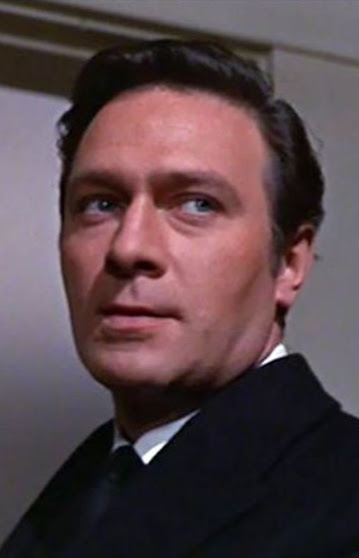 |
| Prince of Darkness: Christopher Plummer as Raymond Swan |
It’s obvious Plummer relishes his role and he plays it to the hilt. (Frankly, I always preferred Plummer’s stern and scary Captain Von Trapp in the early sequences of Sound of Music, before he transforms into the moist-eyed, guitar-wielding, “Edelweiss”-singing Father of the Year. And so, apparently, did he: Plummer always jokingly referred to his most iconic film as The Sound of Mucus.) Fifteen years later, Plummer would play a similar Svengali-like role as Jane Seymour’s producer/lover in Somewhere in Time.
After Daisy Clover, Natalie Wood would go on to enjoy less success than her colleagues on this film...it seems her salad days as a film icon were already over. True, she would costar in the hip sex comedy Bob & Carol & Ted & Alice in 1969, but her credits after that are far from memorable. But, she would be the first to say in her own defense, she found a far more rewarding career as a doting mother raising a houseful of kids, first with second husband Richard Gregson and then after remarrying ex-husband Robert Wagner.
 |
| Cute couple: Their chemistry is undeniable. |
An unsatisfying mélange of hoary showbiz cliches, Inside Daisy Clover is for the most part lugubrious, gloomy and depressing, enlivened by the fleeting moments of camp provided by a couple of rather ludicrous musical numbers, and the strong performances of a seasoned company of actors. Is it melodrama or satire? I still don’t know. The mood in each scene swings between these polarities. But it’s also an opportunity to see some of my favorite actors working in what, regrettably, is not one of my favorite films.
And yes, I’ll definitely be watching it again one of these days. I can’t resist.
This is an entry in the Charismatic Christopher Plummer Blogathon, hosted by Realweegiemidget Reviews and Pale Writer. I look forward to reading all about this acclaimed actor's greatest roles in the days to come.
